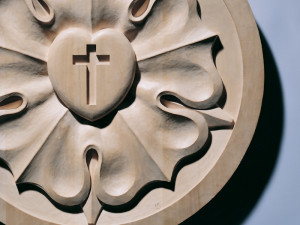by Rev. Dr. Jonathan Mumme
 Many Lutherans are familiar with the category of the two kingdoms, but few, at least in English-speaking Lutheranism, are familiar with a category equally important to Luther’s thinking about human beings and their lives with one another: the three estates.
Many Lutherans are familiar with the category of the two kingdoms, but few, at least in English-speaking Lutheranism, are familiar with a category equally important to Luther’s thinking about human beings and their lives with one another: the three estates.
Variously named the “the three estates” or “the three hierarchies,” according to this schema Luther saw all of human life ordered across three spheres of structured relationships: the politia, the oeconomia, and the ecclesia. These indicate government and state, the household and economic human interactions, and the church. Each estate or sphere is ordered hierarchically (thus the alternative designation, “the three hierarchies”). In each estate there exists a set of hierarchically structured relationships that organize human life under God’s care. The top of each hierarchy stands God himself who endows those ruling and governing in the given hierarchy with their given authority. The basic premise of all hierarchies is that the authority that subsists in each is finally divine.
Thus the state consists of rulers and the ruled. The household, at its most basic level consists of parents and children. And the church consists of clergy and laity. In the state it is the responsibility of kings and princes to rule and govern, likewise this responsibility is for parents in the household and for the clergy in the church. Much like the order evident in the creation account of Genesis, being set over something is not a position of self-serving privilege nor a basis for tyranny and abuse, but instead means the bearing of responsibility for the well-being of those entrusted to the care of those governing. Thus parents are to care for, provide for, and rear their children; clergy are to tend, shepherd, feed, and oversee the people entrusted to their care; and the first thought of statesmen is to be for the well-being and flourishing of their subjects. In the other direction, subjects, children, and laity or parishioners owe their rulers, parents, and clergy honor and obedience as embodied sources of God-given authority charged with their care and governance.
 Though Luther writes no treatise on the matter, it percolates almost ubiquitously through his writings. A familiar example is his exposition of the Fourth Commandment in the Large Catechism. In the Small Catechism Luther identifies the Fourth Commandment as not only speaking of the family (the oeconomia), but also of “other authorities,” whom we are to honor, serve and obey, love and cherish. In his exposition of the Fourth Commandment in the Large Catechism Luther notes that not only biological fathers and heads of households are here indicated, but “fathers of the land” and “spiritual fathers,” thereby indicating the politia and the ecclesia along with the oeconomia.
Though Luther writes no treatise on the matter, it percolates almost ubiquitously through his writings. A familiar example is his exposition of the Fourth Commandment in the Large Catechism. In the Small Catechism Luther identifies the Fourth Commandment as not only speaking of the family (the oeconomia), but also of “other authorities,” whom we are to honor, serve and obey, love and cherish. In his exposition of the Fourth Commandment in the Large Catechism Luther notes that not only biological fathers and heads of households are here indicated, but “fathers of the land” and “spiritual fathers,” thereby indicating the politia and the ecclesia along with the oeconomia.
One may surmise that this category has fallen from popular consciousness since the European revolutions, whose battle cries of liberty, equality, and fraternity announce presuppositions for the subsequent structuring of all human life. Starting from such premises there is a rather visceral reaction to all forms of “paternalism,” “authoritarianism,” and other “isms” of hierarchical disregard. The three estates can, at the very least, serve as a helpful cognitive and reflective platform for analyzing the merits, and demerits, of other, subsequent systems of structuring authority and human life. Despite their unpopularity, at their foundation is a conviction that no Christian committed to the Scripture’s witness will be quick to relinquish, namely that the source of all authority is God, and that systems of organizing authority and human life founded on premises ignorant of that fact or outright contradicting it are, on the grand stage of history, but passing trends.
The Rev. Dr. Jonathan Mumme is Assistant Professor of Theology at Concordia University-Wisconsin in Mequon, Wis.
